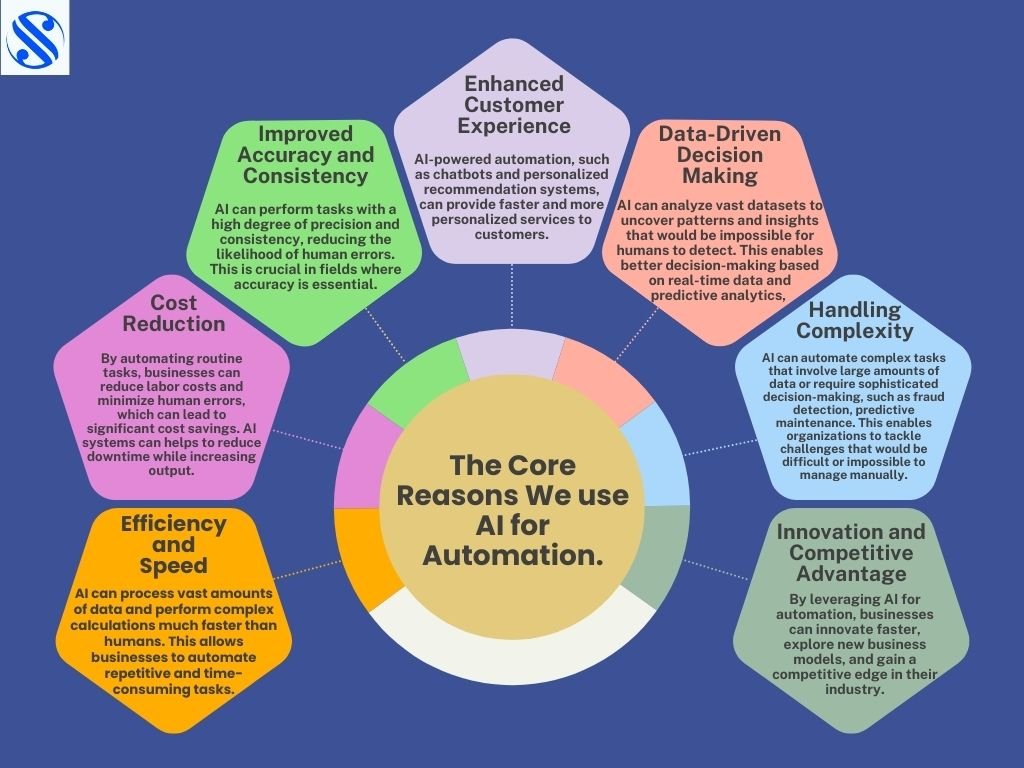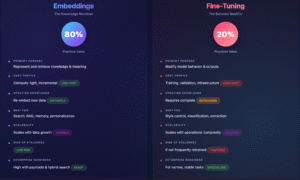The core reason we use AI for automation is to enhance efficiency and productivity by performing tasks that typically require human intelligence more accurately, quickly, and at scale.
1. Efficiency and Speed
AI can process vast amounts of data and perform complex calculations much faster than humans. This allows businesses to automate repetitive and time-consuming tasks, freeing up human resources for more strategic and creative work.
2. Cost Reduction
By automating routine tasks, businesses can reduce labor costs and minimize human errors, which can lead to significant cost savings. AI systems can work continuously without breaks, reducing downtime and increasing output.
3. Scalability
AI systems can easily scale to handle increased workloads without a proportional increase in costs. This is particularly valuable for businesses looking to grow or manage large volumes of data and transactions without the need to continually hire more staff.
4. Improved Accuracy and Consistency
AI can perform tasks with a high degree of precision and consistency, reducing the likelihood of human errors. This is crucial in fields where accuracy is essential, such as healthcare diagnostics, financial forecasting, or quality control in manufacturing.
5. Data-Driven Decision Making
AI can analyze vast datasets to uncover patterns and insights that would be impossible for humans to detect. This enables better decision-making based on real-time data and predictive analytics, allowing businesses to respond more quickly to changes in the market or operational environment.
6. Enhanced Customer Experience
AI-powered automation, such as chatbots and personalized recommendation systems, can provide faster and more personalized services to customers. This improves customer satisfaction and engagement by offering timely and relevant interactions.
7. Availability and Reliability
AI systems can operate 24/7 without fatigue or decline in performance, providing continuous availability and reliable service. This is especially beneficial in customer service, security monitoring, and other areas that require constant attention.
8. Innovation and Competitive Advantage
By leveraging AI for automation, businesses can innovate faster, explore new business models, and gain a competitive edge in their industry. AI allows companies to be more agile and responsive to market demands, positioning them ahead of competitors who rely solely on traditional methods.
9. Handling Complexity
AI can automate complex tasks that involve large amounts of data or require sophisticated decision-making, such as fraud detection, predictive maintenance, or dynamic pricing strategies. This enables organizations to tackle challenges that would be difficult or impossible to manage manually.





Thank you for your sharing. I am worried that I lack creative ideas. It is your article that makes me full of hope. Thank you. But, I have a question, can you help me?
Your point of view caught my eye and was very interesting. Thanks. I have a question for you.
Your point of view caught my eye and was very interesting. Thanks. I have a question for you.
Can you be more specific about the content of your article? After reading it, I still have some doubts. Hope you can help me. https://accounts.binance.com/bn/register-person?ref=UM6SMJM3
Can you be more specific about the content of your article? After reading it, I still have some doubts. Hope you can help me.
Your article helped me a lot, is there any more related content? Thanks!
Your article helped me a lot, is there any more related content? Thanks!
Your point of view caught my eye and was very interesting. Thanks. I have a question for you.
Your point of view caught my eye and was very interesting. Thanks. I have a question for you.
I don’t think the title of your article matches the content lol. Just kidding, mainly because I had some doubts after reading the article.
where to get cheap clomiphene tablets clomiphene or serophene for men where can i get cheap clomid where buy clomiphene without dr prescription can you buy generic clomiphene without rx where can i buy clomiphene without dr prescription can you buy generic clomiphene for sale
Thanks for sharing. I read many of your blog posts, cool, your blog is very good.
I couldn’t weather commenting. Adequately written!
Your article helped me a lot, is there any more related content? Thanks!
More posts like this would bring about the blogosphere more useful.
zithromax 500mg ca – flagyl 400mg cost order flagyl generic
Thank you for your sharing. I am worried that I lack creative ideas. It is your article that makes me full of hope. Thank you. But, I have a question, can you help me?
semaglutide 14mg cheap – rybelsus 14mg price oral periactin 4 mg
motilium cost – flexeril for sale flexeril buy online
Your article helped me a lot, is there any more related content? Thanks!
oral inderal 10mg – buy propranolol cheap where can i buy methotrexate
amoxil pills – cheap generic amoxicillin ipratropium 100mcg price
zithromax 500mg drug – order nebivolol 20mg generic order nebivolol online
order amoxiclav online – atbioinfo purchase ampicillin pills
nexium cost – nexium to us order nexium sale
purchase coumadin online cheap – https://coumamide.com/ losartan 25mg ca
Thanks for sharing. I read many of your blog posts, cool, your blog is very good.
order meloxicam 15mg pills – tenderness buy meloxicam 7.5mg pills
deltasone uk – aprep lson cheap prednisone 5mg
buy ed pills online – https://fastedtotake.com/ free samples of ed pills
how to get amoxil without a prescription – amoxil generic purchase amoxil pills
fluconazole 100mg for sale – https://gpdifluca.com/ fluconazole 100mg cost
buy cenforce online – fast cenforce rs buy cenforce 50mg pills
cialis strength – cialis prices in mexico take cialis the correct way
cost zantac 150mg – online generic ranitidine
cialis with out a prescription – https://strongtadafl.com/# what is the normal dose of cialis
Your point of view caught my eye and was very interesting. Thanks. I have a question for you.
sildenafil 100mg price cvs – https://strongvpls.com/ viagra buy japan
This is the compassionate of scribble literary works I in fact appreciate. site
I’ll certainly carry back to skim more. https://buyfastonl.com/
Thanks towards putting this up. It’s well done. https://ursxdol.com/synthroid-available-online/
More posts like this would add up to the online play more useful. https://prohnrg.com/product/acyclovir-pills/
I don’t think the title of your article matches the content lol. Just kidding, mainly because I had some doubts after reading the article.
More content pieces like this would create the интернет better. https://ondactone.com/spironolactone/
This website absolutely has all of the bumf and facts I needed to this subject and didn’t identify who to ask.
meloxicam generic
Thank you for your sharing. I am worried that I lack creative ideas. It is your article that makes me full of hope. Thank you. But, I have a question, can you help me?
Thank you for your sharing. I am worried that I lack creative ideas. It is your article that makes me full of hope. Thank you. But, I have a question, can you help me?
With thanks. Loads of knowledge! http://fulloyuntr.10tl.net/member.php?action=profile&uid=3135
Your article helped me a lot, is there any more related content? Thanks! https://www.binance.info/en-IN/register?ref=UM6SMJM3
Thank you for your sharing. I am worried that I lack creative ideas. It is your article that makes me full of hope. Thank you. But, I have a question, can you help me?
Thank you for your sharing. I am worried that I lack creative ideas. It is your article that makes me full of hope. Thank you. But, I have a question, can you help me? https://www.binance.info/it/join?ref=S5H7X3LP
buy cheap dapagliflozin – https://janozin.com/# purchase forxiga without prescription
I don’t think the title of your article matches the content lol. Just kidding, mainly because I had some doubts after reading the article.
order xenical without prescription – click xenical pills
Your article helped me a lot, is there any more related content? Thanks! https://www.binance.info/bn/register?ref=UM6SMJM3
Thank you for your sharing. I am worried that I lack creative ideas. It is your article that makes me full of hope. Thank you. But, I have a question, can you help me? https://www.binance.info/en-IN/register?ref=UM6SMJM3
Can you be more specific about the content of your article? After reading it, I still have some doubts. Hope you can help me.
Thank you for your sharing. I am worried that I lack creative ideas. It is your article that makes me full of hope. Thank you. But, I have a question, can you help me? Μπνου εγγραφ Binance
Thank you for your sharing. I am worried that I lack creative ideas. It is your article that makes me full of hope. Thank you. But, I have a question, can you help me?
I don’t think the title of your article matches the content lol. Just kidding, mainly because I had some doubts after reading the article.
You can protect yourself and your ancestors by way of being wary when buying panacea online. Some pharmaceutics websites control legally and offer convenience, reclusion, sell for savings and safeguards for purchasing medicines. buy in TerbinaPharmacy https://terbinafines.com/product/atarax.html atarax
This website really has all of the information and facts I needed to this subject and didn’t know who to ask. sildenafil 200mg for sale
More delight pieces like this would insinuate the интернет better.
Very nice post. I just stumbled upon your blog and wanted to say that I’ve really enjoyed browsing your blog posts. In any case I’ll be subscribing to your feed and I hope you write again soon!
Can you be more specific about the content of your article? After reading it, I still have some doubts. Hope you can help me.
Can you be more specific about the content of your article? After reading it, I still have some doubts. Hope you can help me.
I don’t think the title of your article matches the content lol. Just kidding, mainly because I had some doubts after reading the article.
Để đảm bảo an toàn tối đa cho giao dịch, 66b áp dụng công nghệ mã hóa SSL 256-bit cùng hệ thống xác thực hai lớp (2FA) tùy chọn. Mỗi giao dịch đều được ghi nhận với mã tham chiếu duy nhất, giúp dễ dàng theo dõi và giải quyết vấn đề nếu có.
Can you be more specific about the content of your article? After reading it, I still have some doubts. Hope you can help me.
Okay, I’ve been playing around with 13wwin and it’s actually surprisingly decent. The selection is pretty solid and I haven’t had any glitches so far. Give 13wwin a shot if you’re looking for something new: 13wwin
Alright, so xoso79, huh? I gotta say, I was pleasantly surprised. Good selection of games, and I actually managed to win a little something! Worth a shot if you’re looking for something new. Give it a try! xoso79
Yo, fam! Been playing on qq888com late nights. Got some decent wins! Good vibes all around, recommend giving it a try when you’re feeling lucky.
Looking for a new spot to play. Has anyone had experience with 0007win? Good odds? Fast withdrawals?
Thanks for sharing. I read many of your blog posts, cool, your blog is very good. https://accounts.binance.info/sl/register-person?ref=I3OM7SCZ
betmgm KS betmgm AR mgm bet online
Thanks for sharing. I read many of your blog posts, cool, your blog is very good.
Step up your gaming game with innovative features and stunning graphics. In crown coin casino, live dealer options bring the casino floor to you. Start spinning and winning now!
Unlock endless cascades in Sweet Bonanza, where every tumble builds bigger prizes. Lollipop sweet bonanza vs gates of olympus scatters unlock multiplier-packed free spins. Sweet success starts here!